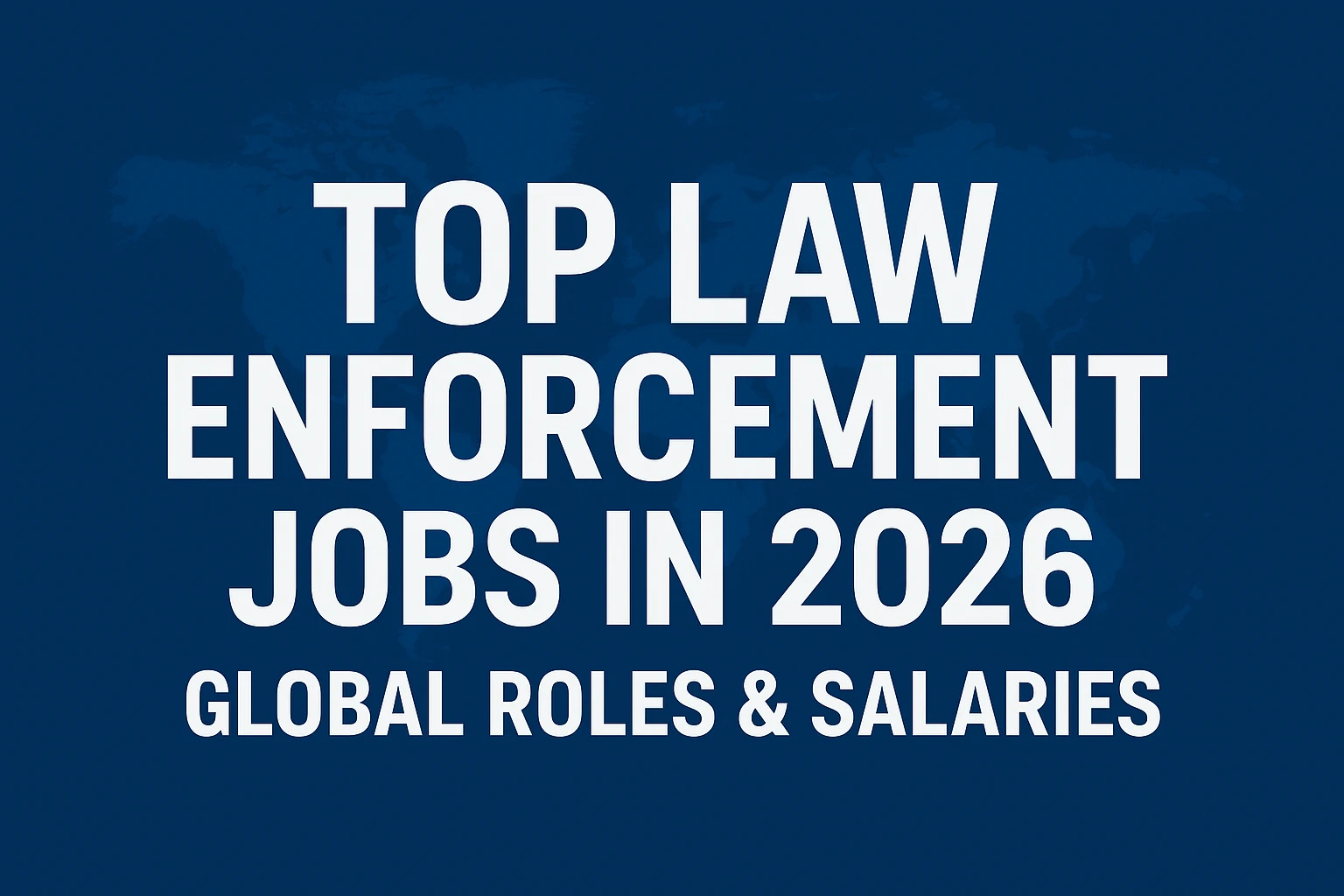In an increasingly complex world, the demand for skilled professionals in law enforcement continues to surge. As we approach 2026, top law enforcement jobs offer not only a sense of purpose but also substantial financial rewards and career growth opportunities. Moreover, with rising global threats like cybercrime and transnational organized crime, these roles are evolving rapidly. This article delves into the best law enforcement careers worldwide, highlighting key positions, their responsibilities, projected salaries, and essential qualifications. Whether you’re a seasoned officer eyeing advancement or a newcomer aspiring to serve, understanding these global roles can guide your path. Furthermore, we’ll explore how technological advancements and international collaborations are shaping the landscape, ensuring these jobs remain vital for public safety. By examining data from leading sources, including the U.S. Bureau of Labor Statistics and international reports, we aim to provide a comprehensive overview. Additionally, factors like location, experience, and specialization play crucial roles in determining earnings and job satisfaction. As such, preparing for 2026 means focusing on adaptable skills and global perspectives. In the sections ahead, we’ll break down specific careers, regional variations, and tips for success, empowering you to make informed decisions.
Table of Contents
- The Role of Police Officers in Modern Policing
- Supervisory Positions: Leading Law Enforcement Teams
- Detective and Investigator Roles: Unraveling Crimes
- Federal Law Enforcement Careers: National Security Focus
- Emerging Law Enforcement Jobs: Cyber and Forensics
- Leadership Roles: Chiefs and Executives in Policing
- Global Variations and Future Outlook
- How to Prepare for Top Law Enforcement Jobs
- Frequently Asked Questions About Top Law Enforcement Jobs
- Conclusion

The Role of Police Officers in Modern Policing
Police officers form the backbone of local law enforcement, responding to emergencies, patrolling communities, and enforcing laws daily. In 2026, this position will emphasize community-oriented policing, integrating technology like body cameras and predictive analytics to enhance effectiveness. Consequently, officers must balance traditional duties with de-escalation techniques and cultural sensitivity training. For instance, in the United States, patrol officers handle everything from traffic stops to domestic disputes, often working irregular shifts that demand resilience. Globally, similar responsibilities apply, though adapted to local contexts—such as urban crowd control in Europe or rural security in Australia. Moreover, with projected job growth of about 5-7% through the decade, opportunities abound for entry-level candidates. However, challenges like public scrutiny and mental health strains highlight the need for supportive agency cultures. Therefore, aspiring officers should seek departments prioritizing wellness programs.
Entry Requirements for Police Officer Positions
To qualify as a police officer, candidates typically need a high school diploma, though many agencies prefer an associate’s or bachelor’s degree in criminal justice. Physical fitness tests, background checks, and academy training—lasting 6-8 months—are standard. In addition, bilingual skills can boost employability in diverse areas. For example, in Canada, the Royal Canadian Mounted Police (RCMP) requires fluency in English or French, opening doors to federal roles. Furthermore, certifications in first aid or firearms proficiency are often mandatory. As a result, preparation involves rigorous physical and academic regimens, ensuring officers are well-equipped for high-stakes environments.
Salary Expectations for Police Officers Globally
Salaries for police officers vary widely by region, reflecting economic differences and cost of living. In the U.S., the median annual pay hovers around $70,000, with top earners in California exceeding $111,000 due to overtime and locality adjustments. Europe shows stark contrasts: Danish officers earn up to €60,000 (about $65,000 USD) annually, while Portuguese counterparts make around €20,000 ($22,000 USD). In Australia, base pay starts at AUD 75,000 ($50,000 USD), rising with experience. By 2026, inflation and recruitment incentives could increase these figures by 3-5%, particularly in high-demand urban centers. Thus, relocation to high-paying locales like New York or Sydney can significantly enhance earnings. Overall, benefits such as pensions and health coverage add substantial value, making this a stable entry point into law enforcement careers.
Building on this foundation, supervisory roles offer greater responsibility and compensation. For insights into other high-demand careers, explore Must-Have Skills for Global Civil Service Jobs 2026.
Supervisory Positions: Leading Law Enforcement Teams
Supervisory law enforcement jobs, such as sergeants and lieutenants, involve overseeing teams, managing operations, and ensuring compliance with policies. In 2026, these positions will increasingly incorporate data-driven decision-making, using analytics to allocate resources efficiently. For example, a police sergeant might coordinate shift rotations while mentoring junior officers on ethical practices. Globally, these roles adapt to jurisdictional needs—from directing border patrols in the U.S. to supervising anti-corruption units in Interpol member states. Additionally, leadership training programs, like those from the FBI National Academy, prepare incumbents for strategic challenges. As a result, supervisors bridge tactical execution and administrative oversight, fostering team cohesion amid rising caseloads.
Key Responsibilities of Law Enforcement Sergeants
Law enforcement sergeants directly supervise patrol units, evaluate performance, and handle disciplinary matters. They also respond to critical incidents, providing on-site guidance. In the UK, for instance, sergeants in the Metropolitan Police manage diverse teams tackling knife crime and terrorism threats. Furthermore, they contribute to policy implementation, such as community engagement initiatives. With cyber threats escalating, sergeants may oversee hybrid units blending traditional policing with digital monitoring. Consequently, strong communication and problem-solving skills are paramount, enabling effective crisis management.
Advancement Opportunities in Supervisory Careers
Advancing to sergeant often requires 3-5 years of patrol experience, plus promotional exams and interviews. In federal agencies like the U.S. Secret Service, internal rotations accelerate progression. Internationally, the European Union Agency for Law Enforcement Cooperation (Europol) offers cross-border training, enhancing resumes for multinational roles. Moreover, pursuing a master’s in public administration can fast-track promotions. By 2026, agencies anticipate a 10% rise in supervisory openings due to retirements, creating prime advancement windows. Thus, proactive networking through professional associations yields long-term benefits.
Compensation for Sergeants and Lieutenants Worldwide
In the U.S., police sergeants earn a median of $85,000 annually, with lieutenants reaching $105,000 in high-cost areas like New York. In Germany, equivalent ranks command €55,000-€70,000 ($60,000-$76,000 USD), bolstered by comprehensive social benefits. Australia’s New South Wales Police sergeants start at AUD 120,000 ($80,000 USD), reflecting strong union negotiations. Projections for 2026 suggest 4% salary uplifts globally, driven by retention efforts. Therefore, these roles provide financial security alongside leadership fulfillment.
Shifting focus to investigative realms, detective careers demand analytical prowess. For related career paths requiring analytical skills, see DM & MCh in India – Complete Super-Specialty Guide.
Detective and Investigator Roles: Unraveling Crimes
Detectives and criminal investigators specialize in solving complex cases, from homicides to financial frauds. By 2026, these top law enforcement jobs will leverage AI for pattern recognition, streamlining evidence analysis. Typically, detectives work plainclothes, conducting surveillance and interviews. In the U.S., they collaborate with forensics teams; internationally, roles like those in Scotland Yard emphasize cross-jurisdictional cooperation. Furthermore, specialization in areas like narcotics or human trafficking opens niche paths. As crime evolves, so do these positions, requiring continuous upskilling in digital forensics.
Daily Duties of Criminal Investigators
Criminal investigators gather evidence, interrogate suspects, and build prosecutable cases. They often testify in court, ensuring justice prevails. For example, in Japan’s National Police Agency, investigators tackle yakuza networks using undercover tactics. Additionally, they analyze digital footprints in cyber-related probes. Hence, adaptability and ethical integrity define success in this high-pressure field.
Pathways to Becoming a Detective
Entry usually follows patrol experience, with many agencies mandating detective exams. A bachelor’s in criminology aids competitiveness. Globally, programs like the International Criminal Police Organization (Interpol) training foster expertise. In 2026, virtual reality simulations will enhance preparation, simulating real-world scenarios. Thus, blending education and fieldwork paves the way.
Global Salaries for Detectives
U.S. detectives average $90,000, topping $120,000 in federal roles. In France, salaries range €40,000-€60,000 ($43,000-$65,000 USD). Singapore offers S$70,000 ($52,000 USD) for CID officers. With 6% projected growth, 2026 earnings may rise accordingly.
Now, exploring federal avenues reveals elite opportunities.
Federal Law Enforcement Careers: National Security Focus
Federal law enforcement jobs protect borders, counter terrorism, and enforce federal statutes. In 2026, agencies like the FBI and DEA will prioritize counterintelligence amid geopolitical tensions. These roles span investigations to protective services, demanding rigorous vetting. Internationally, equivalents include the UK’s MI5 or Australia’s ASIO, focusing on domestic threats. Moreover, federal positions offer prestige and transferability across borders via partnerships.
FBI Special Agent: A Premier Role
FBI Special Agents investigate federal crimes, from espionage to cyber threats. They undergo 20 weeks of training at Quantico. By 2026, AI integration will amplify their impact on white-collar crimes. Thus, diverse backgrounds in law or tech are valued.
Requirements and Training for Federal Agents
A bachelor’s degree and 3+ years of experience are baseline; polygraphs and fitness tests follow. DEA agents specialize in drug interdiction, requiring similar quals. Global analogs, like Canada’s RCMP federal stream, emphasize multilingualism.
Earnings in Federal Law Enforcement
U.S. FBI agents start at $60,000, reaching $130,000+. UK’s MI5 officers earn £40,000-£60,000 ($51,000-$77,000 USD). Projections indicate 5% increases by 2026.
Emerging tech roles are transforming the field. To fund advanced education for such roles, check Education Loan Without Collateral in 2026 – Possible?.
Emerging Law Enforcement Jobs: Cyber and Forensics
Cybercrime investigators and forensic specialists address digital threats and scientific evidence. In 2026, these roles will boom, with 37% growth in info security analysts. Globally, they combat ransomware and deepfakes, collaborating via platforms like Europol’s cyber units.
Cybercrime Investigator Responsibilities
These experts trace hacks, recover data, and prosecute offenders. In the EU, they handle cross-border data breaches. Furthermore, tools like blockchain analysis are standard.
Qualifications for Forensic Careers
A degree in computer science or forensics is essential, plus certifications like CISSP. Hands-on lab experience accelerates entry.
Salaries in Cyber Law Enforcement
U.S. cyber agents earn $100,000-$150,000; UK’s £50,000 ($64,000 USD). Asia’s Singapore leads at S$90,000 ($67,000 USD). Growth ensures rising pay.
Leadership caps the hierarchy.
Leadership Roles: Chiefs and Executives in Policing
Police chiefs and federal directors oversee agencies, shaping policy and budgets. In 2026, they navigate AI ethics and diversity mandates. Internationally, roles like India’s CBI Director emphasize anti-corruption.
Duties of a Police Chief
Chiefs strategize operations, liaise with governments, and promote reforms. U.S. chiefs manage 100+ officers; global peers handle national forces.
Climbing to Executive Positions
20+ years experience, plus MBAs, are key. Mentorship programs aid ascent.
Top Salaries for Law Enforcement Leaders
U.S. chiefs earn $150,000-$250,000; Denmark’s €100,000 ($108,000 USD). Bonuses inflate totals.
Explore leadership skills further in Best MBA Colleges in India and Abroad – 2026 Guide.
Global Variations and Future Outlook
Salaries peak in high-cost nations: U.S. ($97,000 avg.), Nordic Europe (€50,000+), vs. lower in Eastern Europe. Trends include AI adoption and wellness focus, projecting 7% job growth. Challenges like retention persist, but incentives rise.
How to Prepare for Top Law Enforcement Jobs
Pursue degrees, gain experience, and network. Stay updated on trends like the 30×30 initiative for women. Certifications and languages enhance prospects.
Frequently Asked Questions About Top Law Enforcement Jobs
- What Are the Highest-Paying Law Enforcement Jobs in 2026?
- Police chiefs and cybercrime investigators lead, with U.S. chiefs earning $150,000-$250,000 and cyber specialists up to $150,000. Federal roles like FBI agents also command high salaries, often exceeding $130,000 with experience.
- How Can I Become a Police Officer in 2026?
- Start with a high school diploma, though a criminal justice degree boosts prospects. Complete academy training (6-8 months), pass fitness and background checks, and consider bilingual skills for competitive edge.
- Are Cybercrime Investigator Jobs Growing in Demand?
- Yes, with a projected 37% growth for info security roles by 2026. Cybercrime investigators are critical as digital threats like ransomware escalate, requiring skills in AI and blockchain analysis.
- What Education Is Needed for Federal Law Enforcement Roles?
- A bachelor’s degree and 3+ years of experience are typical. Advanced degrees in law or tech, plus specialized training like Quantico’s for FBI agents, are often required.
- How Do Salaries for Law Enforcement Jobs Vary Globally?
- U.S. salaries average $97,000; Nordic countries offer €50,000+; Eastern Europe lags at €20,000-$30,000. High-cost areas like Australia and Singapore provide competitive pay, often exceeding $50,000 USD.
Conclusion
Top law enforcement jobs in 2026 promise impact and reward. From officers to chiefs, global roles evolve with innovation. Start your journey today—serve, lead, and thrive.
Disclaimer
This article provides general information on top law enforcement jobs in 2026 and is not professional or legal advice. Job requirements, salaries, and opportunities vary by region and agency; verify details directly with official sources like government websites or career advisors. The author and publisher are not liable for decisions based on this content. For updates, consult relevant authorities or professional resources.


